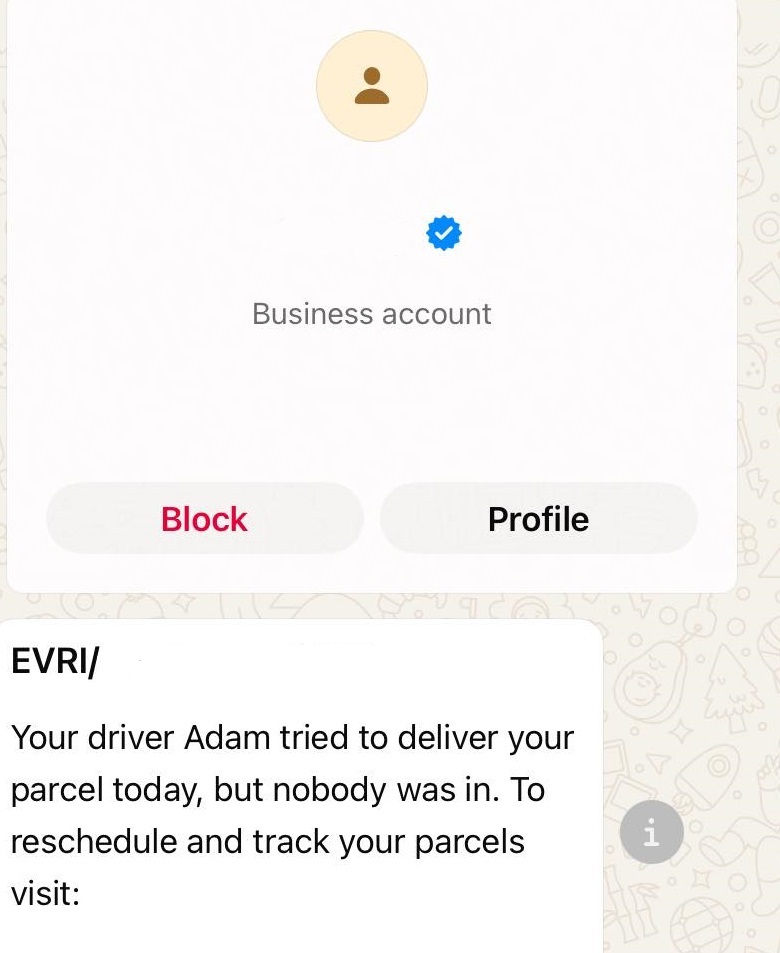Scammers are using verified WhatsApp accounts to carry out delivery scams

WhatsApp messages from compromised verified business accounts tell you that your delivery has ‘failed’ and include links to copycat Evri websites.
We first warned about these scams in February after finding a series of convincing scam messages impersonating delivery companies, which contained links to dodgy websites.
Which? has identified four new examples of these scams, and searches on Google for 'Evri delivery scams' have also spiked in the past week, suggesting that these messages are successfully reaching potential victims.
Meta, the parent company of WhatsApp, announced last week that it had taken down 6.8m accounts linked to scammers.
Read on to find out what these new delivery scams look like and how to spot and avoid scams like these.
Sign up for scam alerts
Our emails will alert you to scams doing the rounds, and provide practical advice to keep you one step ahead of fraudsters.
Sign up for scam alerts
Evri delivery scams

Which? came across four dodgy WhatsApp messages telling you that a courier failed to deliver your parcel because nobody answered the door. It provides a link to follow ‘in order to reschedule a new delivery’.
The message was poorly written, which is the first sign that it's a scam. It also includes a link that isn’t Evri’s official website; the genuine website is evri.com.

The messages are labelled as being sent from ‘verified’ accounts owned by compromised businesses. These verified accounts are available to users who pay a monthly subscription to Meta Verified, or to notable brands.
Users with this status have been verified by Meta based on their activity on WhatsApp and the documents they provide.
When Which? contacted WhatsApp in February about one of the messages we found, it confirmed that the account belonged to a legitimate business that had been compromised. It had banned the account and was working with the legitimate account owners to restore their access.
WhatsApp accounts can be compromised in a variety of ways. Scammers may first carry out a Sim swap attack or create phishing websites, which spread malware to your device or gather your personal details, such as your phone number.
Evri copycat website
Last year, research carried out by Which? and the DNS Research Federation (DNSRF) found that Evri was one of the top five delivery brands most-impersonated by fraudsters.
One of the scam websites linked to from one of the WhatsApp messages looked like the real deal. It convincingly copied Evri’s official website through accurate and up-to-date logos and branding.
It asked for your personal information, including your name, phone number, date of birth and home address, as well as your bank card information.
This provides a wealth of information for scammers that they could use to target you in another scam at a later date. So even if you don’t notice any unusual activity on your bank account, you may be scammed in the future by fraudsters who’ve bought your information.
Spotting scam websites and texts
If you receive an unexpected text, you should always be cautious. Links in text messages are also a red flag, and you should verify the information in the text message through other means, such as visiting the brand’s official website or logging in to your account with that brand.
If you come across a website that you’re suspicious of, make sure you:
- Type it into who.is to see when it was created because newly formed websites should be a red flag. Which? checked the site impersonating Evri and found that it was created under a week ago.
- Check the web address – brands typically have one official website, so anything else should be treated with caution.
- Check the links on the website. On the scam Evri site, all of the links were dead links, meaning they didn’t lead anywhere, showing that the website is just a front to get your data.
You can report scam websites to the National Cyber Security Centre (NCSC) on its website.
To report a WhatsApp user, open up the chat, tap on the sender's contact details and select 'block and report'.
If you lose any money to a scam, call your bank immediately using the number on the back of your bank card and report it to Action Fraud, or call the police on 101 if you’re in Scotland.
Seen or been affected by a scam? Help us protect others
Sharing details of the scam helps us to protect others as well as inform our scams content, research and policy work. We will collect information relating to your experience of a scam, but we won't be able to identify your responses unless you choose to provide your contact details.
Share scam detailsThis news story was originally published on 12 February 2025 and updated on 12 August with new examples of this scam.





